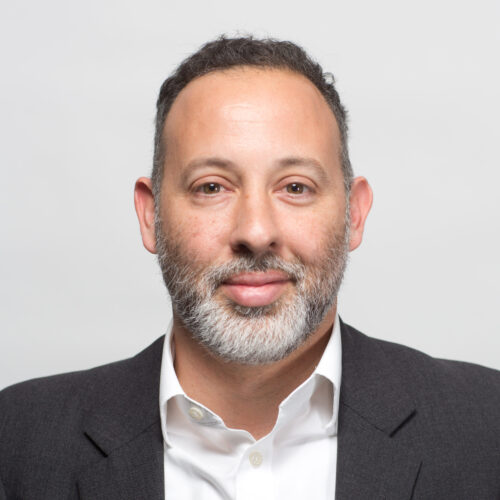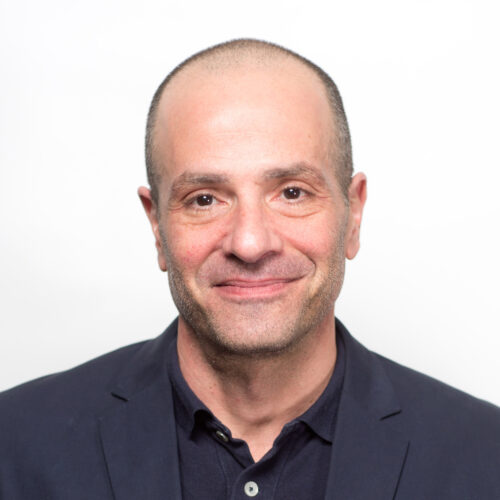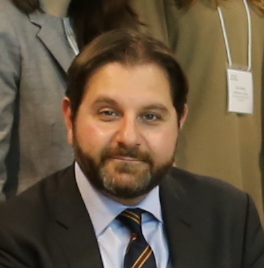-
Ignacio Jaureguilorda

Ignacio Jaureguilorda
-
Robert Wolf

Robert Wolf

Jordan Dressler
Jordan Dressler, the director of the recently created New York City Office of Civil Justice, discusses Mayor Bill de Blasio’s ambitious five-year plan to provide free or low-cost legal assistance to every low-income New Yorker facing eviction, deportation, or other potentially life-altering civil proceedings. The interview focuses in detail on the benefits this guarantee is expected to have on tenants confronting landlords in Housing Court (the latter almost always represented by lawyers). Hosting this episode of New Thinking are Ignacio Jaureguilorda, director of Poverty Justice Solutions, our program that seeks to close the justice gap in Housing Court, and Robert V. Wolf, the Center’s director of communications.
The following is a transcript of the podcast:
JORDAN DRESSLER: It’s been exciting. It’s been daunting. I’ve never done anything like this before, the city has never done anything like this before in the realm of civil legal services.
ROB WOLF: Hi, I’m Rob Wolf, Director of Communications at the Center for Court Innovation. Welcome to another new Thinking Podcast. Today, I’m with my colleague Ignacio Jaureguilorda, who is the director of two of our operating programs here at the Center for Court Innovation, Poverty Justice Solutions, and Legal Hand. Hey Ignacio.
IGNACIO JAUREGUILORDA: Hi.
WOLF: Ignacio and I today are going to be speaking about the Office of Civil Justice, which is a new, relatively new office here in New York City, created by Mayor Bill De Blasio and counsel speaker Melissa Mark-Viverito and we’ll be speaking with the coordinator of that office, Jordan Dressler. Hey Jordan.
JORDAN DRESSLER: Hi. Thanks for having me.
WOLF: Our pleasure. Today we’re talking about the Office of Civil Justice, which you coordinate, which was created about 18 months ago. It’s focus is overseeing the provision or free or low cost legal services to low income New Yorkers. There’s a lot to talk about. Maybe you could tell us a little bit about what went into creating the office. Why was it needed and what’s your mission?
DRESSLER: The creation of the Office of Civil Justice, we call it OCJ sometimes, was sort of the latest step in the increase and enhancement of civil legal services in the city of New York. With the election of Bill De Blasio, and Council speaker Mark-Viverito, there was really this sense that legal services for low income New Yorkers was going to be a lynch pin for reducing income and equality for combating poverty for reducing homelessness. The first step down that path was a consolidation of all the contracts with third party legal providers that had been scattered across the city’s agencies.
They were consolidated under one roof, the Human Resources Administration, which is the city’s Welfare and Social Services Agency, under the leadership of Commissioner Steven Banks, who used to the Attorney and Chief of the Legal Aid Society, so a lot of familiarity with legal services and the important role they can play.
The next step, I would say, was an increase in funding, particularly around the area of tenant legal services. What had been $6 million dollars in administration funding for legal services for low income tenants facing eviction and homelessness over the course of about two and a half years grew to about $62 million dollars, so a ten fold increase to really make these services more widely available, in the courts, in communities, particularly communities in need, and that then led to the realization that there ought to be a permanent home, not only for these services, but for the oversight, the management, and the reporting on these services and what needs remained.
The City Council voted on a local law, the local law was signed by the Mayor and the Office of Civil Justice was created.
WOLF: So how’s it been going? It sounds like you’ve accomplished a lot, $62 million dollars is a lot of money to spend, and consolidating how many agencies are we talking about?
DRESSLER: It’s dozen of legal services providers, in areas of legal need like housing, immigration, services for veterans, services for survivors of domestic violence, low income workers. It’s been exciting. It’s been daunting. I’ve never done anything like this before. The city has never done anything like this before in the realm of civil legal services. It’s been a very exciting run so far, with a lot more to come, because we’re on the verge of launching our plan for universal access for all tenants in housing court facing eviction.
WOLF: Have any themes emerged? I want to talk about the universal access in just one second, but since you’ve had an opportunity to consolidate all these contracts and coordinate it, oversee, get another perspective on how these legal services agencies maybe function, deliver their services, have you learned any lessons or seen any patterns or been able to make changes that you think are improving the way services are delivered?
DRESSLER: I think one of the things that we have seen play out is how important the logistics of access are. It’s one thing to provide funding and create programs, but if those programs are not doing a good job of connecting with tenants in need, immigrants in need, low income New Yorkers in need, then all the access in the world is not all that worthwhile. So those have been challenges, I wouldn’t say obstacles, but challenges to make sure that where the rubber meets the road, particularly in the tenant legal services, you’ve got tenants in need and lawyers who are there to help them. Connection the supply and the demand in a way that’s efficient, in a way that makes these services most widely available, has taken some thought and some effort.
JAUREGUILORDA: Part of the requirement of your office is to put together an annual report. I know you’ve done one report so far. Can you tell us a little bit about what some of the findings were from your first report? The first year of office, how that came about?
DRESSLER: Sure. The office does have a legal mandate to issue an annual report every year, and this year in our second year, to also issue in conjunction with that a five year plan. Our second annual report and our first five year plan will be coming out later this year. A year ago we issued our first annual report and we decided to focus on what we saw as probably the most important question and unanswered question, in the realm of civil legal services in New York City, and that was the level of representation, legal representation, in the housing courts today for tenants facing eviction.
There had been research on this question. It was decades old. It hadn’t been updated, and certainly didn’t reflect the work that we had done as the City of New York, the work that the state judiciary has done in funding legal services providers across the state. Just this past year, $100 million dollars, much of that in the realm of housing work. We thought it was our job to kind of inject some rigor into the questions that had been surrounding all the policy debate about what to do about access to counsel in the housing courts.
We focused specifically on the question of how prevalent was representation for tenants in housing court facing eviction. The most recent funding had been in 2013, where the state court system estimated that about 1 percent of tenants had lawyers and 1% of landlords did not have lawyers. A real David and Goliath story. We did work last spring and found that 27% of tenants in housing court facing eviction had lawyers. So pretty dramatic increase, but obviously farther to go, if the goal was to be universal access to counsel.
We didn’t take a position on where to go. We did do a lot of stakeholder interviewing, and also did some statistical analysis to see what is the impact of counsel been so far. In the two years since we had increased access to legal services in the housing courts, we found that evictions had decreased by 24 percent. These were very encouraging findings that we were on the right track with providing access, that that access was leading to results, and it really laid the groundwork for a very sober discussion about what universal access to counsel in housing court would actually look like. Several short months later, there we were with an actual plan in hand that was agreed to by the mayor and the City Council.
WOLF: So now you’re spending $93 million to carry out the plan for universal access?
DRESSLER: It will actually be $155 million, because we’re building on the commitments we’ve already made to the tune of $62 million dollars for tenant legal services. That will be at the end of a five year implementation plan. We couldn’t do this, today. There aren’t enough lawyers in the City of New York with the right kind of expertise, or the right kind of supervision, for any of us to snap our fingers and say, “We’ll provide universal access today.” We’re taking an incremental approach, building on the programs we already have, and over the course of five years, expect to cover the entire city, so that every tenant who’s facing eviction in housing court has access to legal advice.
WOLF: Has any other jurisdiction in the United States, as far as you know, done something like this?
DRESSLER: We are fairly certain we are the first. We’re certainly the largest.
JAUREGUILORDA: Let’s talk a little bit about the logistics of the rollout. As you say, you don’t have enough attorneys right now. Where are you going to find them? What are some of the other challenges that you’re going to face?
DRESSLER: First and foremost might be space. There are housing courts across the city, and they have been designed and filled without having a lot of lawyers for tenants in them. So the spaces, the shared spaces, the courtrooms, are really not equipped to handle this massive influx of lawyers. Certainly aren’t equipped today, but the court system has been a great partner, as we’ve implemented our existing programs and continue to implement the universal access plan going forward, and I think are well aware of how business as usual in the housing courts, just from a logistical and a process stand point, is going to need to change to encompass all of this new legal support for tenants.
JAUREGUILORDA: Jordan, do you get a sense of what the details of the plans will be in implementation?
DRESSLER: Yeah. The broad goal here, and the intention, is so that at the end of five years, every New Yorker facing eviction in housing court, regardless of their income level, regardless of where they are, or where they live, will have access to legal assistance in court. That’s new because right now our legal services are specifically dedicated for low income New Yorkers.
JAUREGUILORDA: When you say low income New Yorkers, you mean?
DRESSLER: We set the limit at 200 percent of the federal poverty guidelines, which for a family of four is about $50,000.00 a year. Right now, legal services are available only to folks at or below that level. With the universal access plan, as we rollout neighborhood to neighborhood, area to area, anyone in those areas that are a part of our area, regardless of their income level, will have access to legal advice and assistance. Anyone at or below that low income level will have access to full legal representation, meaning a lawyer handling their case, standing next to them on their case, from the beginning until the end.
JAUREGUILORDA: How are you determining which areas to rollout first?
DRESSLER: It’s based on an evaluation of need. There’d been some discussion about targeting particular populations, vulnerable populations, and the fact of the matter is that one of the things we learned over the course of the last couple of years, is that it is very difficult if not impossible for the court to play a role in identifying folks who fall within particular population categories. The court doesn’t know if someone’s a senior, if someone’s a veteran, but they do know if a case is in a particular zip code. What’s more, if we are targeting particular zip codes with particular programming, there’s accountability in looking at how many cases were there actually in this zip code and how many did our programs reach?
Very difficult, if not impossible, to do when you’re talking about something tied to the tenant as opposed to tied to the case. So we’ve had good success in targeting zip codes so far. Our expanded legal services program in which the universal access program is going to be built, has targeted zip codes that were particularly high feeders of the homeless shelter system and now we’re looking at a broad array of criteria, including the presence of unregulated housing in the zip code, and other eviction pressures.
WOLF: How are you going, in fact, to bridge the gap between, you know, there are services available and finding those clients, because you made reference to that before, that that was one of the patterns you had seen. There’s a resource available, but that’s not necessarily getting to the client it’s designed to serve?
DRESSLER: It’s everything from a comprehensive outreach plan to reach people where they live, to refining the process of actually connecting with the lawyer in the court house, to make sure that it’s not too burdensome for the tenant. Right now in some court houses, in order to access legal services, you have to go from the courtroom, which is on one floor, to the HRA office, which is on another floor, to the legal services office, which is on a third floor, and then back to the courtroom.
If it’s a building where the elevators don’t work, and it takes 25 minutes to get from one place to another, folks won’t do that. We’re working with the courts and the legal services providers to actually bring the legal services and the access points directly into the courtrooms, where the cases are being heard. We’re now working with the courts and the providers on something broader where, hopefully, we would have some sort of intake point, similar to a criminal court arraignment, where the case would be heard, and there would be a formal assignment of counsel and everyone would sort of pass through this gate and be provided the access to legal assistance or legal representation that they’re entitled to.
WOLF: Are there any plans to change the way the court process works around evictions or even laws? There are other approaches, presumably there are other ways to reduce homelessness and reduce evictions, beyond providing legal representation. That may just go well beyond the purvey of your office, but I’m just wondering, if there’s a larger context in which we can put city efforts to reduce homelessness and prevent eviction?
DRESSLER: The Office of Civil Justice is within the Human Resources Administration, and specifically within the Homelessness Prevention Administration, part of HRA, and that’s because these tenant legal services are part and parcel with a broader effort to prevent and reduce homelessness. HRA has done a tremendous amount of work just over the last couple of years, in increasing access to emergency rental assistance. These legal services efforts are part of a suite of efforts intended to reduce homelessness.
WOLF: Beyond evictions, since you are about civil legal services, what are some other future plans or other ideas you have that you might are interested in enacting, as far as representing other kinds of civil cases?
DRESSLER: Well, we oversee a wide variety of immigration legal services, it’s probably our single biggest portfolio unto itself, and those run the gamut between brief legal assistance to let immigrant New Yorkers know what their rights might be, to full fledged legal representation in very complicated legal matters. Beyond that, I think an area that we want to spend some time looking at is the area of consumer debt as another barrier to progress for New Yorkers and their families.
There are a wide variety of legal issues that that includes. Everything from default judgements against folks who didn’t even know they were facing a debt, that come back to haunt them on their credit reports, to digging their way out from identify theft, particularly in cases of survivors of domestic violence. We are taking a hard look at it, as well as sort of a wide variety of other legal services needs and it will all be part of our five year plan for the future of the City’s civil legal services.
WOLF: Thank you very much. Ignacio Jaureguilorda and I have been speaking with Jordan Dressler, who is the founding coordinator of the Office of Civil Justice, which is just 18 months ago, was born just 18 months ago. To find out more about your work, is there a website or somewhere people can go?
DRESSLER: Sure. NYC.gov/civiljustice, all one word.
WOLF: For more information about the Center for Court Innovation, you can visit us at www.courtinnovation.org and you can subscribe to our podcast on iTunes or wherever you might get your podcasts. Thank you very much for listening.